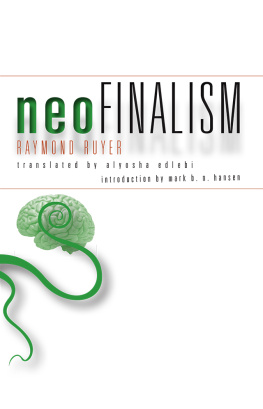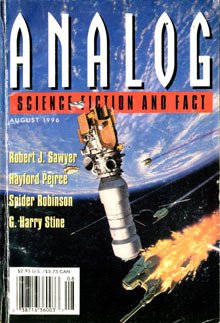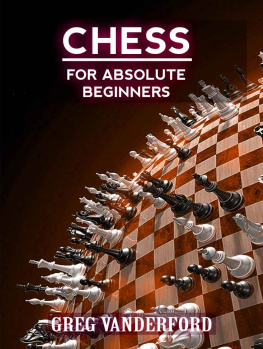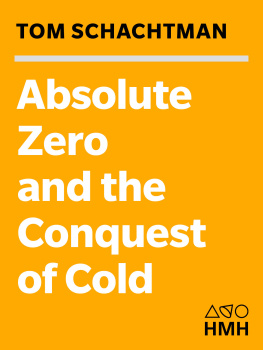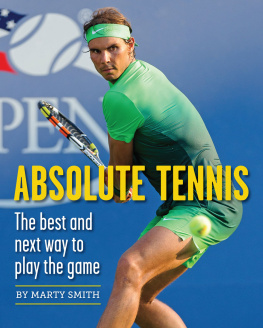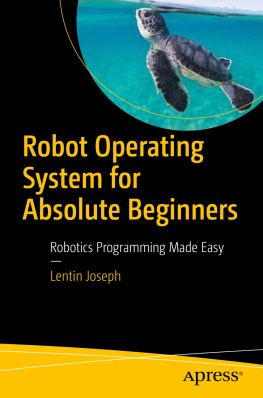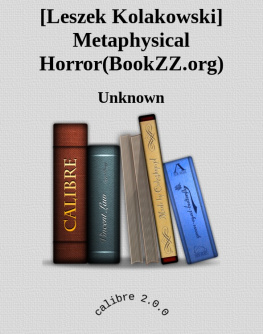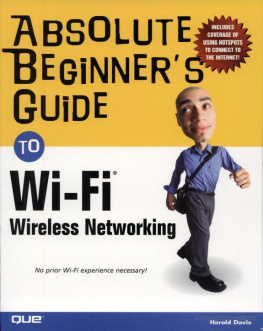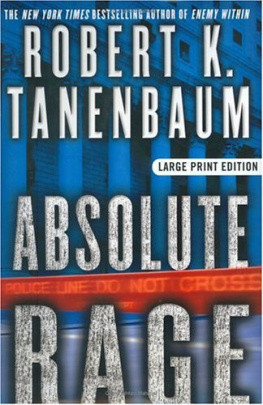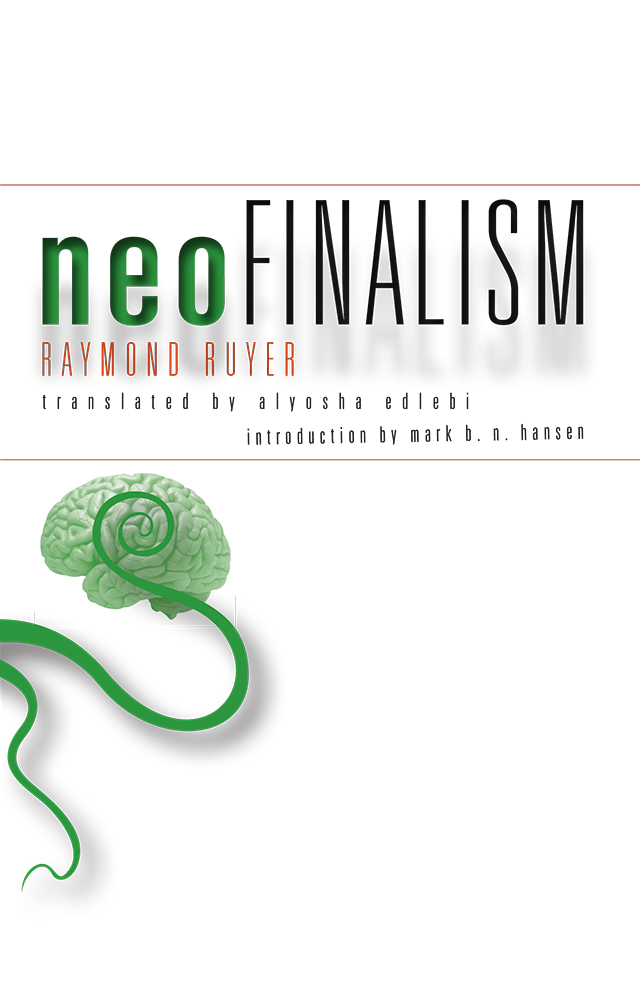Neofinalism
Raymond Ruyer
Translated by Alyosha Edlebi
Introduction by Mark B. N. Hansen

University of Minnesota Press

Minneapolis London
Originally published in French in 1952 as No-finalisme; copyright Presses Universitaires de France, second edition 2012.
Translation copyright 2016 by the Regents of the University of Minnesota
All rights reserved. No part of this publication may be reproduced, stored in a retrieval system, or transmitted, in any form or by any means, electronic, mechanical, photocopying, recording, or otherwise, without the prior written permission of the publisher.
Published by the University of Minnesota Press
111 Third Avenue South, Suite 290
Minneapolis, MN 55401-2520
http://www.upress.umn.edu
Library of Congress Cataloging-in-Publication Data
Ruyer, Raymond, 19021987.
Neofinalism / Raymond Ruyer ; translated by Alyosha Edlebi ; introduction by Mark B. N. Hansen.
Includes bibliographical references and index.
ISBN 978-1-4529-5011-2
1. Teleology. 2. Philosophy, Modern. I. Title.
BD542.R8713 2016
124dc23 2015019116
The University of Minnesota is an equal-opportunity educator and employer.
Contents
Form and Phenomenon in Raymond Ruyers Philosophy
Mark B. N. Hansen
Philosophy has a duty to avoid snobbery, but also not to fall prey to timidity.
Raymond Ruyer, Lesprit philosophique
Raymond Ruyer (190287) was born in Plainfaing in the Department of Vosges in the Lorraine region of northeastern France. A precocious student who at nineteen received a first on his college entrance exam, Ruyer pursued a course of study in philosophy at the prestigious cole Normale Suprieure and aggregated in 1924. While teaching at the lyce of Saint-Brieuc, Ruyer published his two theses, Esquisse dune philosophie de la structure (Outline of a philosophy of structure) and LHumanit de lavenir daprs Cournot (Humanity of the future according to Cournot). In 1934, he returned to the Vosges region, taking up a position at the University of Nancy, where he was subsequently appointed matre de confrences (1939) and professor (following the war). From 1940 to 1945, Ruyer was a prisoner of war in a camp for French soldiers in Edelbach, Austria, where he participated in a vibrant intellectual culture with a number of scholars, including the biologist tienne Wolff and the geologist Franois Ellenberger, both of whom would go on to prominence. It was during this time of internment that Ruyer wrote what would become the first expos of his mature system, lments de psycho-biologie (Elements of psychobiology; published in 1946). After the war, Ruyer would go on to a solid university career as professor of philosophy at the University of Nancy. Author of twenty-two books and more than one hundred articles, Ruyer fully embraced his penchant for philosophy of the esprit mtaphysique, by which he meant philosophy in its proper form, philosophy that is interested not only in everything [au tout] but in Totality [au Tout].
The publication of the English translation of Ruyers masterpiece, This fact is all the more unfortunate given the manifold resonances that link Ruyers philosophical corpus to key concerns of contemporary philosophy and cultural theory in both English- and French-language circles, including such hot-button issues as the mindbody problem or the presuppositions behind biological morphogenesis.
More than any other factor, it is Ruyers attitude toward science that may ultimately account for whatever impact his work will have on contemporary intellectual debates. Like William James and Alfred North Whitehead, both of whom are currently undergoing revitalizations of their own, and like his compatriot Gilbert Simondon, whose work has for some time now garnered critical attention and respect, Ruyer is a philosopher who not only deeply respects the work of scientists but believes at heart that his own work bears a crucial responsibility to science. The ultimate aim of Ruyers philosophy is precisely to provide the metaphysical basis on which the empirical findings of scientific research can be made to cohere.
The Duality of Mind and Appearance
This attitude is clearly manifest almost from the very outset of Ruyers career. One could argue that Ruyers break with his own initial devotion to structuralisma devotion that finds quintessential expression in his primary thesis (Esquisse dune philosophie de la structure)represents the single most consequential development of his entire philosophical career. For it is this break, and the differentiation of functioning (fonctionnement) from structure, that informs Ruyers later theorization of a transspatial domain of form that lies beneath and in-forms what happens in space and time. As we shall see, this key insight stems from Ruyers philosophical working-through of scientific research, in this case, in the burgeoning field of embryology: not only does Ruyer aim to explain how the embryo holds the potential for the future development of an organism but he seeks to develop the process of embryogenesis into a philosophical model for the operation of form as such.
The first step inand in a certain sense, the theoretical cornerstone ofRuyers philosophical transfiguration of science is his meditation on consciousness in his 1937 book La conscience et le corps (Consciousness and the body). In this work, his first post-thesis book-length publication, Ruyer argues (somewhat scandalously to me upon my initial reading of it some fifteen years ago) that consciousness is an absolute form of being and, as a consequence, that the body is epiphenomenal. Yet far from seeking to displace the body, Ruyers aim here is to overcome the dualism between consciousness and matter that, in his opinion (and on this point, he is certainly not alone), has plagued the history of modern philosophy from Descartes onward. Ruyers point, it is important to emphasize, is a methodological one: the consciousnessmatter divide raises what, for him, is simply a badly posed question. That is why, in the place of the mindbrain dualism central to the mindbody problematic that has informed Western philosophy from Descartes to contemporary analytic philosophy, Ruyer introduces a different kind of dualisma duality between mind and appearance.
Informing this duality is Ruyers conviction that consciousness, to be what it is, must possess itself absolutely. Consciousness must, that is, enjoy a sensory reality prior to and independent of any perceptual reality it may give rise to or that may be given to it. In this sense, Ruyers philosophy inaugurates a line of exploration that diverges from the dominant strains of philosophy, and especially of phenomenology, in vogue at the time of his apprenticeship and in the early phases of his academic career. Where phenomenology generically takes intentionality, the relation of consciousness to an object or the aboutness of consciousness, as a primitive, Ruyers philosophy of consciousness insists on absolute sensation as its foundation. Consciousness does not have a visual (or phenomenal) field as its intentional object. It is this field itself.
Ruyers position entails the valuation of unity over against distance: consciousness is above all absolute self-possession or unity, and the absolute sensation composing its being is simply

